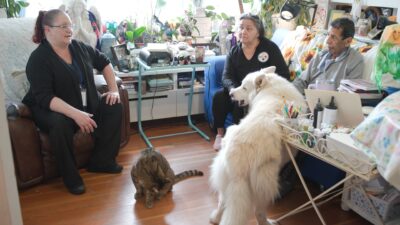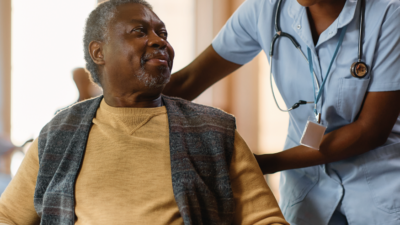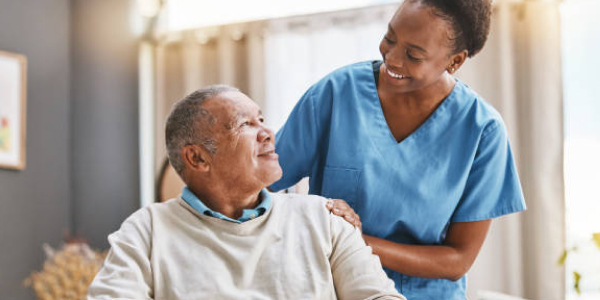The hospice model of care depends on caregivers — either hired professionals or family members and friends — to meet the day-to-day needs of patients. This is especially true when hospice care is provided at a private residence rather than a nursing home or other facility.
Many people consider it a duty, a calling, or even a privilege to care for a loved one in their final months, weeks, or days of life. It can be a rewarding experience, but also a difficult one.
Dividing caregiving tasks among a team of family and friends can help to alleviate caregiver burnout.
Caregiver responsibilities
The patient’s health status and home environment determine the extent of caregiving required.
Caregivers should be prepared to adapt as the patient’s needs change.
Beyond the services provided by the hospice team, family caregivers for home-based patients will be responsible for the day-to-day care needs of their loved one:
- Providing companionship.
- Managing the household and shopping for groceries.
- Preparing/providing meals and helping patients eat and drink.
- Assisting with physical activity/mobility.
- Monitoring, managing, and administering medications.
- Aiding with personal care and hygiene.
- Caring for pets in the home.
- Helping with financial matters, such as making sure utility bills are paid.
Caregivers also may assist with advance care planning or other practical matters, such as discussing funeral arrangements or who will receive special possessions. Learn more about end-of-life planning.
How hospice helps
Family members and friends may be thrust into the role of hospice caregiver, often with little preparation or knowledge of what to expect.
Even those who have been providing care during a patient’s long-term illness may find the shift to hospice care somewhat daunting. Changes in the patient’s health status, unfamiliar medication and dosing schedules, and the patient’s increased reliance on caregivers can make this a new and challenging experience.
Fortunately, hospice care is structured to provide support to both the hospice patient and their family caregivers. Caregivers can expect the hospice team to:
- Develop a care plan customized to the patient’s needs.
- Offer information and instruction on how to provide care.
- Share practical tips, advice, and strategies to help caregivers manage their role.
- Address concerns around key tasks such as administering medications, providing proper nutrition, and helping the patient with personal hygiene.
Providing support for family caregivers is part of the hospice team’s role. Caregivers may call the hospice at any time to ask questions, raise concerns, or seek advice.
Time off for caregivers
Caregiving often involves irregular hours and little time away. As a caregiver, you should try early on to find others who can step in periodically so you can have some down time and avoid burnout.
In addition to enlisting help from family members and friends, ask the hospice provider if volunteers are available. An adult volunteer may be able to visit for an hour or two each week so you can take care of other chores or simply rest and relax.
If you need a longer break or there is a sudden change in circumstances — for example, if the primary caregiver becomes ill — ask the hospice provider about respite care.
Respite care provides up to five days of care for the patient outside of their home, usually at a local nursing home or inpatient hospice facility. Hospice is the only part of the U.S. healthcare system that provides this type of relief for caregivers.
Talk with the hospice team if your self-care needs begin to increase or if you feel overwhelmed by your responsibilities. To take care of your loved one effectively, you must also take care of yourself.
Your income while caregiving
Caregiving frequently creates financial pressure. Many caregivers cannot afford to give up their job or their paycheck to take care of a loved one for an extended period of time. Caregivers also may have additional out-of-pocket expenses in addition to lost wages and uncompensated work.
Help may be available through federal, state, or local programs. Families also may be able to assist. Read about options for supplementing your income, offsetting the costs of being a caregiver, and protecting your employment.
Caregiver self-care
Many family caregivers struggle with challenging feelings such as anticipatory grief, guilt, anger, anxiety, exhaustion, loneliness, and sadness.
As your loved one’s health declines, your caregiving responsibilities may increase, and you may find you have less time to care for your own mental and physical health. Read a guide to self-care for caregivers.
Patient safety concerns
Family caregivers often worry about safety, whether they are providing care at the patient’s place of residence or bringing a loved one into their own home. In either case, the hospice team will arrange for delivery of assistive devices and durable medical equipment, such as a hospital bed.
To make a home setting safer:
- If possible, set up your loved one’s bed on the main floor, with access to a bathroom and kitchen/eating area. Remove furniture, electrical cords, and clutter along common pathways — the bathroom to the bedroom, the bedroom to the kitchen, etc.
- Request a hospital bed, which can be lowered closer to the floor at night or when the patient is in bed and unsupervised. Ask the hospice team for “fall floor mats” if your loved one is at risk for falls.
- Increase lighting and add motion-activated nightlights along common pathways. Remove scatter rugs and mats to prevent trips and slips.
- Install grab bars in the tub/shower and next to the commode. Add a raised toilet seat and non-skid shower seat.
- Ensure that your loved one has well-fitting shoes with non-skid soles.
- Set the hot water heater to 120 degrees Fahrenheit or less to prevent accidental scalding of thin, delicate skin.
- Ensure that smoke and carbon monoxide detectors are working. If supplemental oxygen is in use, keep a fire extinguisher close by.
- Secure all firearms.
Safety is a particular concern for hospice patients with dementia, especially if they live in a relatively unsupervised setting, such as an independent living facility. Until the person with dementia can be moved to a setting with 24/7 supervision, take these steps to make their living quarters safer:
- Remove stove knobs or disconnect the stove and other potentially hazardous appliances. Arrange for meal delivery so there is no need to turn on the stove.
- Check that fire and carbon monoxide alarms are working; keep a fire extinguisher on hand.
- Install extra lighting, including motion-activated lights, in every room.
- To discourage wandering, use a curtain to camouflage exit doors.
- Install security cameras so family members can monitor daily activities. Encourage the patient to maintain a consistent daily routine.
In addition, have the patient wear an ID bracelet with their name, address, and the name and phone numbers of key contacts. Provide a personal emergency response (“medical alert”) monitor routed to a nearby family member, the community living facility’s staff, or a local emergency response system. And consider hiring private caregiving providers or sitters if needed.



